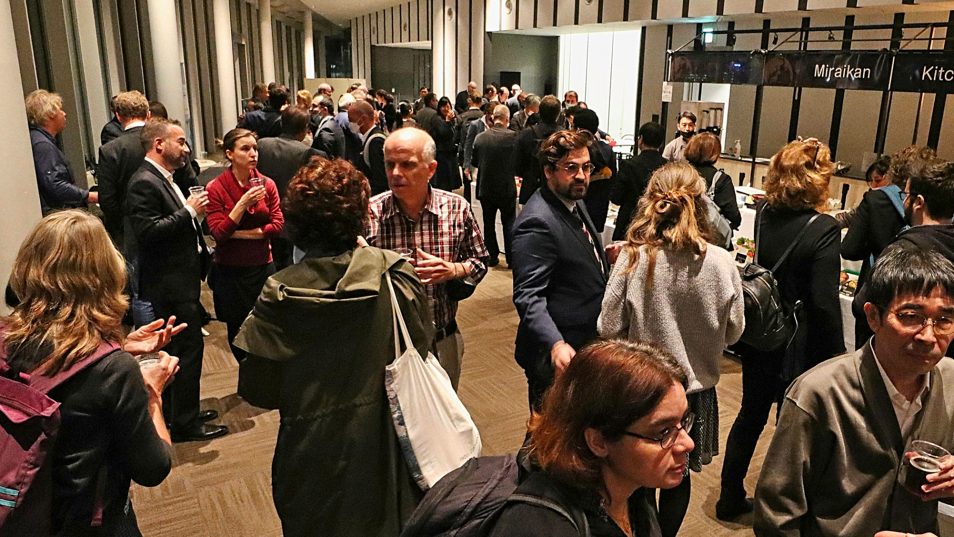A deep dive into AI
 © DWIH Tokyo
© DWIH Tokyo
Facilitating dialogue on all aspects of artificial intelligence has been a priority for DWIH Tokyo for several years, and it reached a new high point in 2022. The 3rd Japanese-German-French Symposium on Artificial Intelligence directed its attention to several fields in which AI can help find sustainable solutions to global problems.
In his welcome address at the opening of the 3rd Japanese-German-French Symposium on Artificial Intelligence, DAAD President Professor Joybrato Mukherjee said, “This symposium offers a wide array of perspectives and provides an outstanding forum for networking between Japan, Germany and France, as well as between science, industry and policymaking.” This view went on to be shown to be very true. Under the heading of ‘AI for Planetary Challenges in the Anthropocene’, over 60 speakers explored questions on all aspects of AI before audiences gathered in the Miraikan, Japan’s National Museum of Emerging Science and Innovation in Tokyo. Their topics ranged from security questions associated with AI to its relevance to disaster protection, as well as chances and opportunities in education and healthcare. The symposium was organised by the DWIH Tokyo, AI Japan R&D Network and the French embassy in Japan.
Three topic areas exemplify how the symposium’s examination of the challenges of the Anthropocene also drew out connections to the DWIHs’ 2022 focus topic “Sustainable innovations”. Despite their differences, these topic areas show how AI can help solve global problems.
AI and climate change
How can AI help us predict and understand extreme weather events? Professor Andreas Dengel, Managing Director of the German Research Center for Artificial Intelligence in Kaiserslautern, joined Professor Ronan Fablet from IMT Atlantique University in France and Professor Masahiro Watanabe from the University of Tokyo to discuss work on this area which is currently underway in these three countries. Counteracting global warming and its deadly responses requires many different responses, particularly in the world’s major cities. As part of the trilateral symposium, Professor Katharina Morik from TU Dortmund University led a session on AI for Sustainable & Smart Cities. She used her talk to show how using big data to analyse traffic flows not only has the potential to help deal with weather-related disasters but also to contribute to more environmentally-friendly mobility.
AI and green development
Two sessions dedicated to AI in agriculture and biodiversity research explored how AI can help humans use and yet still protect nature. A discussion on biodiversity made it plain that AI-driven data monitoring could be key to monitoring and maintaining species diversity. The session on AI and agriculture also revealed how universities, research institutes and businesses are collecting vast quantities of data in order to make agriculture more environmentally friendly. Talks by Dr Takahiro Kawamura, an expert on data management at Japan’s National Agriculture and Food Research Organisation, and Alexis Comar, CEO of Hiphen, were just two of the illuminating contributions on this topic. Hiphen is a French company which specialises in high-tech phenotyping. One of the benefits from analysing the appearance of plants is the potential for adapting agriculture to climate change. The organisers of the symposium were also delighted to welcome Professor Sonoko Bellingrath-Kimura from the Leibniz Centre for Agricultural Landscape Research in Germany to chair the agriculture session. Professor Bellingrath-Kimura is a pioneer in using data to promote efficiency and sustainability in agriculture.
AI and threats to democracy
Questions about the responsible use of AI have been a recurring theme ever since the trilateral series of symposia on AI began. For example, Professor Arisa Ema from the University of Tokyo convened a session on the ethical and legal aspects of AI at the very first symposium in 2018, and she chaired a discussion on the ‘regulation and democracy of AI’ in 2022. The session covered issues ranging from protecting the private sphere to the problem of fake news. In his talk, Professor Bernd Holznagel from the University of Münster showed how the new European Digital Services and Artificial Intelligence acts reduce the risks of the misuse of artificial intelligence. Another session was dedicated to ‘trustworthy AI’ and a session on ‘AI and cybersecurity’ showed how AI can offer concrete answers to security problems. The power of AI is particularly significant in classifying malware, and also in identifying and warning of cyber attacks.
The very speed of the digital transformation demands wide-ranging discussions on AI such as those which the DWIH Tokyo has been facilitating for several years. The trilateral symposium brought together speakers from Japan, Germany and France with expertise ranging from the law to machine learning, putting founders of German start-ups specialising in fighting dementia next to Japanese scientists working on ageing societies. All these were joined by policymakers and representatives of the business community. Just later a workshop took place in Tokyo, prompted by the participants themselves, to take up issues from the symposia. Future such events are also planned.
Johannes Göbel
